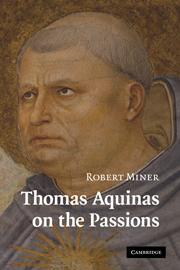Book contents
- Frontmatter
- Contents
- List of figures
- List of tables
- Acknowledgments
- A note on the texts
- Introduction
- Part 1 THE PASSIONS IN GENERAL
- 1 The sensitive appetite
- 2 The definition of passion
- 3 The activation of passion
- 4 The morality of the passions
- Part 2 PARTICULAR PASSIONS: THE CONCUPISCIBLE PASSIONS
- Part 3 PARTICULAR PASSIONS: THE IRASCIBLE PASSIONS
- Bibliography
- Index
2 - The definition of passion
Published online by Cambridge University Press: 06 July 2009
- Frontmatter
- Contents
- List of figures
- List of tables
- Acknowledgments
- A note on the texts
- Introduction
- Part 1 THE PASSIONS IN GENERAL
- 1 The sensitive appetite
- 2 The definition of passion
- 3 The activation of passion
- 4 The morality of the passions
- Part 2 PARTICULAR PASSIONS: THE CONCUPISCIBLE PASSIONS
- Part 3 PARTICULAR PASSIONS: THE IRASCIBLE PASSIONS
- Bibliography
- Index
Summary
Having located the passions in the sensitive appetite, Aquinas may be expected to offer a general definition of passion. Aquinas seems to nourish this expectation. His actual procedure is somewhat different and more interesting. Rather than provide a general definition at the outset, Aquinas takes the reader through a series of considerations that throw light on the matter (§2.1). But the illumination seems quickly to turn into darkness. First, why does Thomas restrict passions to the sensitive appetite? Are there not experiences that involve no sensory component, yet count as passions (§2.2)? Second, Thomas's apparent endorsement of the claim that passions are “motions” has struck many readers as not only antiquated and confusing, but also inconsistent with what he says about other passions, especially love and pleasure. Why does Thomas use the language of motion to describe the passions? If the passions are invariably accompanied by physiological effects that are bodily motions, is it the case that Thomas equates the passions with somatic events (§2.3)? Aquinas does not stop with the claim that every passion is a motion of the sensitive appetite. He finds it important to divide the passions into “irascible passions” and “concupiscible passions.” Is this simply an instance of Aquinas's deferring to a long tradition? Does he recognize any intrinsically compelling reason to divide the sensitive appetite into an irascible power and a concupiscible power? In the 1a pars, Aquinas grounds the irascible/concupiscible distinction in the more basic difference between the useful good and the pleasant good (§2.4). He provides an elaborate application of the distinction in Question 23 of the 1a2ae. I argue that the fruitfulness of Question 23's application amounts to a second justification of the distinction (§2.5).
- Type
- Chapter
- Information
- Thomas Aquinas on the PassionsA Study of Summa Theologiae, 1a2ae 22–48, pp. 29 - 57Publisher: Cambridge University PressPrint publication year: 2009
- 1
- Cited by



